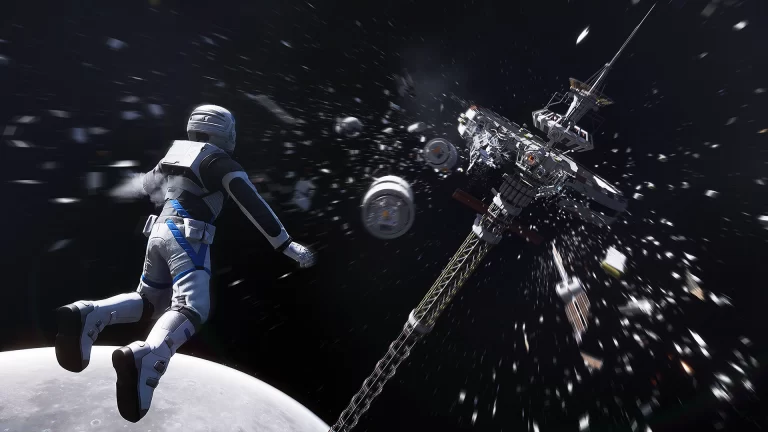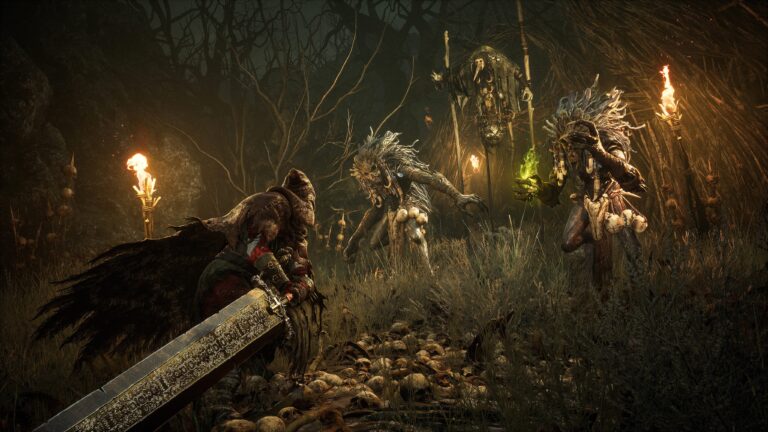The video game industry seems rife with remakes as of late, popular titles from the past bestowed with new life for a modern generation. From Final Fantasy VII to Resident Evil 2, remakes fill fans with both longing and dread, as older gamers hunger to share their favorites with a new crop of players—praying the entire time that the remake remains true to the original.
In this, the remake era of gaming, there remains one franchise which has not yet cropped up in discussion—an egregious error that should be rectified with all haste. Legacy of Kain.
When the PlayStation first entered the lives of gamers back in the ‘90s, it brought with it the opportunity for video game developers to break ground in new, innovative ways. Compact discs replaced cartridges, their vast amounts of relative storage allowing for enormous amounts of data, and the shift from 16-bit to 32-bit (and later 64-bit) graphics marked the swap from two-dimensional gameplay to three. To top it off, CD-quality sound meant games could ship with crystal-clear voice acting and epic orchestral soundtracks that blew previous midi-based music out of the water.
The Legacy of Kain series took all of these elements and combined them to do something that had never been done before in the realm of video games: employ epic, cinematic storytelling steeped in Gothic fantasy, with dialogue delivered in a dramatic, Elizabethan fashion by classically trained actors. Starting with Blood Omen and continuing on through Soul Reaver, Soul Reaver 2, Blood Omen 2, and finally, Defiance, millions of players across the world found themselves invested in the struggles of eponymous antihero Kain—and of the fallen, fate-torn Raziel, first of Kain’s vampiric children.
Looking at all the other remakes that have seen recent release and are planned for the future, it seems odd—and a little bit sad—to think that as of yet, fans haven’t heard even a single whisper regarding Legacy of Kain. The entire series deserves a remake, and now is the perfect time for an enterprising team to produce one.
A Profound Storyline That Features Compelling Characters
Some fans of the Legacy of Kain series might find themselves surprised to learn that there were once some questions raised regarding whether or not titular vampire Kain was a character with whom players would empathize. The general idea behind the overarching plot was simple on the surface, but simultaneously a philosophically fathomless ocean: What is evil, anyway? Perhaps nothing more than a point of view?
Kain exemplifies this concept in Blood Omen, with his refusal to sacrifice himself to restore the Pillars of Nosgoth, condemning the world to corruption. A simple mind which views actions as either right or wrong and sees only in black and white would say Kain’s actions were evil, as they plunged the world into a dystopia where the seemingly-selfish vampire ruled his empire with a despotic iron fist.
A more complex mind, however, might recognize that evil never sees itself as such, and point out that if Kain had restored the pillars, he would have ensured the destruction of his own race. This dilemma is similar to the one faced later by Sylvanas Windrunner in World of Warcraft—another character whose actions might be seen as evil by the majority, but are, in truth, undertaken as a means to preserve the lives of those under her rule.
The blurred line between good and evil is not the only theme humming a dramatic, gothic melody throughout the series. No singular entity exists in Nosgoth more aware of Kain’s dark depravity than Raziel—former Sarafan priest, and the first of Kain’s vampiric children. Vengeance drives Raziel, his mind fixed on a singular goal: destroy his former mentor. Though Kain’s name graces the title of the series, it’s an indisputable fact that it is Raziel who serves as the franchise’s main protagonist.
First shown at the height of his vampiric evolution, Raziel displays his new-grown wings to Kain, who strikes his lieutenant down for having the audacity to become more powerful than even his master. Reduced to a wraith, Raziel exists within the shell of his former self, his destiny bound to the Soul Reaver.
What follows is a twisting, immersive trip through the land of Nosgoth and the depths of time, as Raziel fights against, and eventually becomes a reluctant ally of, Kain. It’s difficult to go into more depth without spoiling the story for those who have not yet experienced it, but suffice it to say that as players witness the manipulation of Raziel by the Elder God and his servants, they are drawn into the narrative and find themselves invested in his journey.
The fallen vampire’s battle against fate and his discovery that he alone is free of destiny’s grasping coils is well-written—a brilliant and timeless story that a new generation of gamers should have the chance to experience.
Generation X is the Nostalgia Generation:
Generation X bears among its distinctions the honor of being the first generation to explore video gaming, first with the release of Pong and its rudimentary predecessors—and then through to Atari consoles, ColecoVision, the original NES, and beyond. They were the first gamers to throw barrels at a giant monkey, and the first gamers to rescue Peach from the pixelated clutches of Bowser, only to find that their princess was in another castle.
If there’s one thing that Generation X is known for, it’s their love of nostalgia. Ask any Gen X’er about The Smurfs, Jem, Fraggle Rock, Saved By the Bell, or Disney’s Gummi Bears, and they’ll go on to describe in great detail how these shows “defined their childhood.” Everything from cartoons to movies to sugary cereal brands evokes a wistful sigh from Generation X, and video games are no different.
Blood Omen, the first of the Legacy of Kain titles, released in 1996 for the original PlayStation, right when the tail end of Generation X was in its third year of high school. Gaming hadn’t yet entered the mainstream—at the time still within the realm of “nerds” right along with Dungeons & Dragons and Magic: The Gathering.
Still, the Legacy of Kain series garnered quite a following, and many gamers look back on it with fond memories. It makes perfect sense, then, that a generation defined by their memories of youth might want to see one of the most innovative games of its time remade with the technology of today.
What Developers Can Do Better in a Remake:
Despite their general greatness, the Legacy of Kain games were not without their issues. Blood Omen was produced in 2d, and the Soul Reaver games drew mild criticism for short gameplay length combined with a perceived lack of replayability, as well as what some considered ambiguous endings.
Rectifying the first problem is easy, as any remake of the series would mean Blood Omen would be reproduced in 3d. Replayability issues, however, might take a bit more thought.
One concept developers thinking of taking on this project might consider is combining the entire series into one game. While at first this idea might give fans pause, it’s important to consider that the reason the original games each ended in an ambiguous manner was that they were always intended to be continued. Soul Reaver 2 even begins with the exact same cutscene that ends its prequel.
Further, after combining the games into one, developers could create multiple endings dependent on player actions. The Legacy of Kain story is, after all, about vampires who can travel through time. The story itself hinges on this, as Raziel chases Kain throughout Nosgoth’s history attempting to change the past in order to save the future.
By combining all the games into one massive title and providing multiple endings for players to explore, an ambitious studio could erase the few problems Legacy of Kain suffered from, bringing it closer to the heights of perfection.
How a Remake Can Find Success:
Remakes are a touchy subject among fans, who dread them for the same reason they crave them—nostalgia. Certain elements of any remade IP must remain intact, lest its rebooters drive away the very fans they wish to attract. When it comes to Legacy of Kain, there are two elements that development teams must adhere to above all others in the creation of a remake: The voice acting, and staying true to the original story.
Legacy of Kain has long stood out for its marvelous voice acting, featuring Simon Templeman as Kain, Michael Bell as Raziel, and Anna Gunn as the spectral ghost, Ariel. Templeman has provided voices for the Dragon Age and Mass Effect series, as well as World of Warcraft and Star Wars: The Old Republic. Other than his portrayal of Raziel, Bell is perhaps best known as the voice of the sorcerer Medivh from the Warcraft universe, and Anna Gunn is most recognizable for her role as Skylar White in the hit television series Breaking Bad.
These three voice actors are integral to the atmosphere of Legacy of Kain, delivering their lines in a Shakespearian manner that fits the gothic ambience of Nosgoth in the most perfect manner. These voices make the characters. Sly, condescending Kain, who always has just a hint of derision woven into his arrogant tone. Self-righteous Raziel, whose voice bears within it the strain of suffering spliced together with the burning fires of vengeance. Sorrowful, heartbroken Ariel, forever floating amongst the Pillars, mourning the loss of her beloved Nupraptor. To recreate these games in any way without hiring these particular talents would be a travesty, and drive dedicated fans away from purchasing a remake.
Along with the original voice actors, any Legacy of Kain remake should also include the original writers of the story. Director, designer, and writer Amy Hennig, in particular would be integral to the process, for even she has stated that Soul Reaver is her greatest achievement. After the release of Legacy of Kain: Defiance, Hennig departed Crystal Dynamics to work as creative director for Naughty Dog, a position she then left in 2014 to join Visceral Games to work on their ill-fated Star Wars project. Hennig departed EA in January, 2018, and in November 2019 announced she had joined Skydance Media to start a new division there for “new story-focused experiences [that] will employ state-of-the-art computer graphics to provide the visual fidelity of television and film, but with an active, lean-in experience that puts the audience in the driver’s seat.”
Legacy of Kain has been available for external developers to license through the Square Enix Collective since 2017, so this is the perfect opportunity for Hennig to pick up her magnum opus and re-create it, driving it to new heights with all she has learned from her years in the industry.
A Remake Would Be Great, Thanks:
Gaming has come a long way since Blood Omen: Legacy of Kain first brought players to the world of Nosgoth in 1996. Twenty-three years have passed since the franchise made its debut, during which time amazing strides were made in game engines and graphics, while more sophisticated technology allowed for more complex mechanics and complicated coding. An entire new crop of gamers has come into the world, and those who came before are bursting at the seams to share their favorite titles with them.
To remake the Legacy of Kain series in its entirety would be a gift to gamers both old-school and new. To not remake Legacy of Kain while every other series under the sun seems to warrant a reboot would be a crime against gaming itself.
No related posts.







